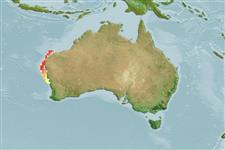分类 / Names
俗名 | 同种异名 | Catalog of Fishes(属, 种) | ITIS | CoL | WoRMS | Cloffa
Teleostei >
Perciformes/Scorpaenoidei (Scorpionfishes) >
Neosebastidae (Gurnard scorpionfishes)
Etymology: Neosebastes: Greek, neos = new + Greek, sebastes = august, venerable (Ref. 45335); occidentalis: Name from the Latin 'occidentalis' meaning west, referring to the distribution of the species being the westernmost in the genus..
Environment: milieu / climate zone / depth range / distribution range
生态学
海洋 居于水底的; 深度上下限 100 - 185 m (Ref. 54394). 热带; 20°S - 30°S (Ref. 54394)
Eastern Indian Ocean: Off the central western coast of Western Australia.
东印度洋: 外海的西澳大利亚的中央西岸。
大小 / 重量 / 年龄
Maturity: Lm ? range ? - ? cm
Max length : 18.0 cm SL 雄鱼/尚未辨别雌雄; (Ref. 54394)
简单描述
检索表 | 型态特徵 | 形态测量图
背棘 (总数) : 8; 背的软条 (总数) : 8; 臀棘: 3; 臀鳍软条: 5. Diagnosis: Underside of mandible with numerous tiny pores, no ridges. Preocular spine usually divided into 2 points, and flattened anteriorly and posteriorly. There are no additional spines between lacrimal and suborbital ridges; upper opercular spine usually divided into 2-4 points; midinterorbital space extremely deep, usually not covered with scales; interorbital ridge distinct. Pored lateral-line scales 32-36 (mode 33); longitudinal scale rows 50-56 (55). Pectoral-fin rays 18-21 (21); pectoral fin long (2.4-3.0, mean 2.7 in SL), reaching or extending beyond a vertical at origin of last dorsal-fin spine. First anal-fin spine 1.5-1.7 (1.6) in third spine. Posterior margin of maxilla not reaching a vertical at posterior margin of pupil. Interorbital width wide (5.7-7.5, 6.8 in HL). Bilobed portion of swimbladder less than half of total swimbladder length; head and body whitish in preservative specimens. Body, head, and pelvic and anal fins nearly white or yellowish when fresh; no distinct small black spots on head or lateral line (Ref. 54394).
鉴别: 下颚的下面有很多的极小孔 , 没有脊。 眼睛前面的棘通常分开成 2 点, 而且前面地而且在后部地平的。 没有在泪骨与眶下骨脊之间的附加棘; 上面的鳃盖棘通常分开成 2-4 点; 眼间隔中央非常深的, 通常不覆盖着鳞片; 眼间骨脊明显的。 有细孔的侧线鳞片 32-36(模态 33); 纵向的鳞片列 50-56.(55) 胸鳍鳍条 18-21;(21) 胸鳍长的 (2.4-3.0, 意谓 2.7 分之一标准体长), 达到或延伸超过最后背鳍棘的在起源的一条垂直线。 第一个在第三根棘中的臀鰭棘 1.5-1.7(1.6)。 顎骨的後緣不達到瞳孔的在後緣的一條垂直線。 廣闊地 (5.7-7.5, 6.8個 HL比率) 的眼間骨寬度. swimbladder 的分成兩葉部分少於一半的總 swimbladder 長度; 頭部與身體微白色的在標本保存狀態下標本。 身體,頭部與腹鰭與臀鰭幾乎白色或淡黃色的新鮮時; 沒有在頭部或側線上的明顯的小黑色的斑點.(參考文獻 54394)
Found on the continental shelf (Ref. 75154). Most specimens taken in trawls have sand grains inside the mouth indicating occurrence on open, predominantly sandy substrata (Ref. 54394).
采自拖网的大多数的标本有在开放又主要沙的下层土壤上指出发生的沙子谷粒嘴巴内。 (参考文献 54394)
Life cycle and mating behavior
Maturities | 繁殖 | Spawnings | Egg(s) | Fecundities | 仔鱼
东印度洋: 外海的西澳大利亚的中央西岸。
Motomura, H., 2003. Revision of the scorpionfish genus Neosebastes (Scorpaeniformes: Neosebastidae), with descriptions of five new species. Indo-Pac. Fish. (37):46 p. (Ref. 54394)
人类利用
工具
特别资料
下载 XML
网络资源
Estimates based on models
Preferred temperature (Ref.
123201): 19.2 - 22.7, mean 20.1 °C (based on 7 cells).
Phylogenetic diversity index (Ref.
82804): PD
50 = 0.5002 [Uniqueness, from 0.5 = low to 2.0 = high].
Bayesian length-weight: a=0.01995 (0.00906 - 0.04395), b=3.01 (2.83 - 3.19), in cm total length, based on all LWR estimates for this body shape (Ref.
93245).
营养阶层 (Ref.
69278): 3.6 ±0.4 se; based on size and trophs of closest relatives
Fishing Vulnerability (Ref.
59153): Low vulnerability (12 of 100).
